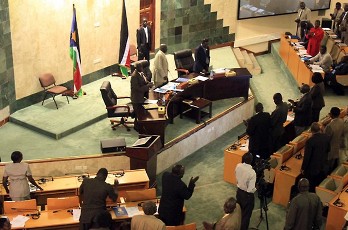South Sudan activists slam parliament’s weak stance on federalism
July 11, 2014 (JUBA) – A South Sudanese activist has criticised the national parliament for showing reluctance to lead debate on federalism, questioning why the legislature hasn’t taken a symbolic stance.

“But you find issues like the current debate about federalism and the way the peace talks are progressing in Addis Ababa, Ethiopia, are not discussed. And the more hurting thing is that they seem not [to be] bothered by [the] behaviours of the security personnel, even when they know they do not have the basis for harassing journalists,” he added.
He also questioned why the legislative body hadn’t taken more leadership in guiding current debate about federalism across the country.
“Until yesterday (Thursday) when I was in Juba, the parliament had not shown any interest to open a debate about federalism. Is it because they do not see the importance of this debate? I don’t know,” he said.
“But I have observed that this parliament takes no symbolic stance on issues of national importance … They are even not questioning the behaviour of the security, even though they know very well that they have not passed any guiding regulation,” he said.
“There is no security law that I know had been passed by the parliament at the moment,” he added.
Meanwhile, a journalist with the Citizen newspaper attributed the parliament’s reluctance to fear of being sacked by the president should they raise a motion supportive of public debate on federalism.
“I do not blame these members because majority of the current members of parliament are those who came to the house because their weakness which the ruling party used as the advantage to deny the competence candidates the opportunity during the 2010 elections because they know very well that weak members would not be able to challenge and question the executive on certain critical issues,” he said.
He said he knows of some MPs who have never raised a hand in parliament to pose a question on any subject matter being discussed before the house.
“To be honest with you, there are members of parliament I know myself that do not talk. They only go there to sign the attendant and leave or sit to watch, without making [any] contribution because they do not know any other language apart from the mother tongue or some English words which cannot convey any meaningful message,” he explained.
“RUBBER STAMP” HOUSE
One government critic described the national parliament as a “rubber stamp” house, saying it was filled with “yes groups” purporting to be representative of the people.
“This idiocy that is happening is because many of the current members of parliament representing the areas they claim to represent in this assembly see that the way you get noticed is to propose a ridiculous motion,” he said.
“Of course, everyone knows that the legislative fashion is strictly for more restrictions. You need to sponsor a motion … which bans something, shuts something down. That is what gets rewarded … It’s all going in one direction, which is to tighten restrictions, toughen penalties, close any possible loopholes in previous laws,” he adds.
He claimed that despite the government already having significant controls in place, it still felt the need to intensify restrictions and debate over federalism.
Moses Duku Simon, an independent political analyst, said there has been an “abominable drop in the quality of legislative acts”.
“Very rarely is there anything resembling reasonable debate. Initiatives tend to get rushed through this parliament in short order. Objections or arguments against the measures seldom get a hearing,” he said.
“The sheer number of laws which are not properly discussed is totally unprecedented,” he adds.
(ST)
